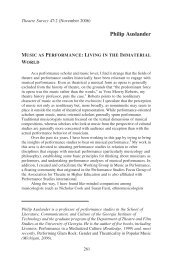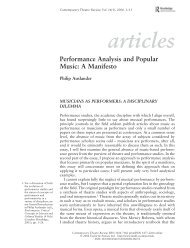INTERACTION DESIGN PRINCIPLES FOR INTERACTIVE ...
INTERACTION DESIGN PRINCIPLES FOR INTERACTIVE ...
INTERACTION DESIGN PRINCIPLES FOR INTERACTIVE ...
Create successful ePaper yourself
Turn your PDF publications into a flip-book with our unique Google optimized e-Paper software.
television producers to create shows that consider the shared group<br />
communications dynamic experience (possibly for many related groups<br />
independently at once) and not the individual or the mass audience solely as a<br />
viewer unit. Community or public television in other words will, potentially, – at<br />
last – emerge when ITV technologies make video and data content a platform for<br />
discussion and participation (2000).<br />
As we discussed in chapter three, participation is one of the key elements inherent<br />
to television genres such as sports, dramas, and reality programs, where viewers are<br />
always eager to participate and weigh in with their opinions. And as we have seen in<br />
chapter five with examples such as CBS’ C.S.I. Interactive, and ABC’s Celebrity Mole:<br />
Yucatan, compelling interactive content can do a great deal in convening an audience<br />
around a television program.<br />
Ben Cunningham concurs with Swedlow regarding iTV’s potential to turn<br />
television into programs targeted at large special interest groups; this model of large-<br />
scale, conversation making, high-rating TV is what he calls “Event TV” (2003).<br />
According to Cunningham, “Interactive TV technology allows us to turn TV shows into<br />
events, because the public can now participate easier than ever before. Event TV is a<br />
great platform driving Interactive TV usage as it allows greater levels of participation,<br />
and gets the nation talking” (2003). In addition, this model of television broadcasting is<br />
well suited to multi-platform applications using the Web, TV, mobile and gaming<br />
devices. Michael Grade, the former chief executive of the U.K.’s Channel 4 Television,<br />
said that interactive television may be something to “make the event more eventful”<br />
(quoted in Gawlinski, 2003).<br />
While iTV convenes communities, it also promises to provide users with richer,<br />
more personalized entertainment. It will evolve toward new levels of social interaction,<br />
both through the network and in the future, directly with each other. Another model of<br />
community that may evolve in the realm of iTV is that of a peer-to-peer one. We have<br />
182














